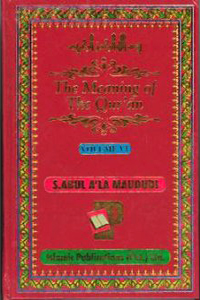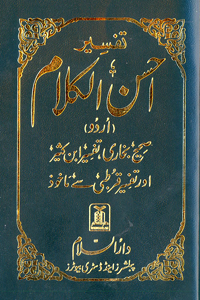![]()
About the Book
Sayyid Abul Ala Maududi (September 25, 1903 – September 22, 1979) was a Muslim political philosopher, theologian, journalist and activist. In 1941, he was the founder of the Pakistani political party Jamaat-e-Islami, dedicated to Iqamat-e-Deen, the establishment of a pure Islamic state, governed by Sharia law.
Maududi is one of the most popular and well-respected ideologues in the Muslim world. His 120 books include Muslims and the Present Day Political Struggle, Jihad in Islam, and the Rights of Muslims in an Islamic State.
Like Tafsir Ibn Kathir, Maududi’s Tafhim al-Qur’an is a surah-by-surah explanation of the Qur’an. Originally written in Urdu, the book has been translated and released in many languages. An English-language version is available in print under the title, Towards Understanding the Qur’an, published by The Islamic Foundation in 2006, in both a single-volume and multi-volume set.
Maududi, in the Introduction to Tafhim al-Qur’an, expressed ideological similarities with political Islamists like Qutb and the Muslim Brotherhood. In his discussion of “the Islamic Movement” and the “stages” of progressive revelation, Maududi makes plain that his expurgation of the Qur’an has a definite political— rather than personal and piestic– intention:
One cannot understand fully many of the topics discussed in the Qur’an unless one is acquainted with the background of their revelation. One should know the social, historical or other antecedents or conditions which help explain any particular topic. For, the Qur’an was not revealed as a complete book at one and the same time; nor did Allah hand over a written copy of it to Muhammad at the very beginning of his mission and command him to publish it and invite people to adopt a particular way of life. Moreover, it is not a literary work of the common conventional type that develops its central theme in a logical order; nor does it conform to the style of such a work. The Qur’an adopts its own style to suit the guidance of the Islamic Movement that was started by Allah’s Messenger under His direct command. Accordingly, Allah revealed the Qur’an piece-meal to meet the requirements of the Movement in its different stages.
Maududi’s book, Four Basic Qur’anic Terms, is endorsed by The American Muslim website in its “List of Recommended Books on Islam.” The list also contains works by several writers included in the Mapping Shari’a Project’s survey of texts which advocated the use of violence in the pursuit of a Shari’a-based political order or advocated violent jihad. The American Muslim recommends books by al-Nawawi (author of Riyad-us-Saliheen, al-Misri’s Umdat al-Salik, the Tafsir Ibn Kathir, and the Qutb’s explicitly political tract, Milestones.
[In addition, The American Muslim recommends work by the spiritual leader of the Muslim Brotherhood, Yusuf al-Qaradawi. It is no surprise that the website and its author, Sheila Musaji, have been highly critical of US anti-terror policy and any negative criticism of Islamism, the Muslim Brotherhood.]
Maududi is also the author of Jihad in Islam, another text classified as “severe” by the Mapping Sharia Project.
![]()
Availability
Because of Maududi’s stature as one of the giants of 20th Century Islamist politics and theology, his many of his works are readily available online and in print. TeachIslam.com hosts a total of 39 of Maududi’s books in PDF format, including Understanding the Qur’an, Understanding Islam, and The Economic System of Islam.
An English-language version is available in print under the title, Towards Understanding the Qur’an, published by The Islamic Foundation in 2006, in both a single-volume and multi-volume set. Amazon.com contains several listings for the text, in abbridged, complete and even pocket-sized versions.
Maududi’s Tafhim al-Qur’an is available online in English, in an HTML format, organized by surah at Englishtafsir.com and Islamicstudies.info.
![]()
Read It For Yourself
Author: Sayyid Abul Ala Maududi
Title: Tafhim al-Qur’an (Towards Understanding the Qur’an)
This book is divided into three volumes: Volume 1 (PDF, 399 pages, 17.7MB); Volume 2 (PDF, 370 pages, 16.8MB), and Volume 3 (PDF, 346 pages, 15.4MB).
![]()
Relevant Quotes
Like Tafsir Ibn Kathir, Maududi’s Tafhim al-Qur’an is critically important to Muslims around the world, influencing their reading and understanding of their most revered scriptures. As we have seen from the book’s introduction (excerpted above), the “revolutionary” and political intention of Maududi’s works are not consonant with a personal, piestic interpretation of Islam, or what’s known as a ‘separation of mosque and state.’ In light of that fact, it is alarming that a such a book– and also Maududi’s Jihad in Islam— is as widely available and revered as it is in American mosques.
![]()
On Jihad:
- Salat, Fast, Zakat, Haj and Jihad have been prescribed for the moral training of the Ummat [Muslim community]. Sura 2–Al-Baqarah
- In the sight of Allah, there are two distinct parties of fighters. One party is that of the Believers who fight for the cause of Allah in order to establish his way on His earth, and every sincere Believer is bound to perform this duty. Sura 4–An-Nisa
- Thus, this verse exhorts the Believer to fight his enemies on all fronts. On one side, he confronts Satan and a host of his followers, and on the second, his own self and its alluring temptations. On the third side, he has to fight many people who have swerved from the way of God, and with whom he is bound by close social, cultural and economic relations. On the fourth side, he is required to oppose all those religious, cultural and political systems that are founded on rebellion against God and force people to submit to falsehood instead of the Truth. Though these enemies employ different weapons, they all have one and the same object in view, that is, to subdue their victims and bring them under their own subjection. It is obvious that true success can only be achieved if one becomes wholly and solely a servant of God and obeys Him openly and also secretly, to the exclusion of obedience to all others. Thus there is bound to be a conflict with all the [f]our enemies: Therefore the Believer cannot achieve his object unless he engages himself with all these hostile and opposing forces at one and the same time and at all events, and removing all these hindrances marches onwards on the way of Allah. Surah 5–Al-Ma-idah
- This aim [of Islamic warfare] has two aspects– the negative and the positive. On the negative side, the aim of war is to abolish (fitnah), and on the positive, it is to establish Allah’s Way completely and in its entirety. This is the only objective for which it is lawful, nay, obligatory for the believers to fight. Sura 8–Al-Anfal
![]()
On Women:
- If the wife is defiant and does [n]ot obey her husband or does not guard his rights, three measures have been mentioned, but it does not mean that all the three are to be taken at one and the same time. Though these have been permitted, they are to be administered with a sense of proportion according to the nature and extent of the offense. [I]f a mere light admonition proves effective, there is no need to resort to a severer step. As to a beating, the Holy Prophet allowed it very reluctantly and even then did not like it. But the fact is that there are certain women who do not mend their ways without a beating. In such a case, the Holy Prophet has instructed that she would not be beaten on the face, or cruelly, or with anything which might leave a mark on the body. Sura 4–An-Nisa
![]()
On Non-Muslims:
- In this portion [verses 13-37] the Muslims have been urged to fight in the Way of Allah with the mushrik [polytheistic] Arabs, the Jews and the Christians, who were duly warned of the consequences of their mischievous and inimical behavior. Sura 9–At-Taubah
- The second reason why Jihad should be waged against them is [th]at they did not adopt the Law sent down by Allah through His Messenger.[Humiliation/reduction in status] is the aim of Jihad with the Jews and the Christians and it is not to force them to become Muslims and adopt the `Islamic Way of Life.’ They should be forced to pay Jizyah [poll tax] in order to put an end to their independence and supremacy so that they should not remain rulers and sovereigns in the land. These powers should be wrested from them by the followers of the true Faith, who should assume the sovereignty and lead others towards the Right Way, while they [Jews and Christians] should become their subjects and pay jizyah. Sura 9–At-Taubah
- This Command [to fight the unbelievers and hypocrites] enunciated the change of policy towards the hypocrites. Up to this time, leniency was being shown to them for two reasons. First, the Muslims had not as yet become so powerful as to take the risk of an internal conflict in addition to the one with the external enemies. The other reason was to give trough (sic) respite to those people who were involved in doubts and suspicions so that they could get sufficient time for attaining to faith and belief. But now the time had come f[o]r a change of policy. The whole of Arabia had been subdued and a bitter conflict with the external enemies was about to start; therefore it was required that these internal enemies should be crushed down so that they should not be able to conspire with the external enemies to stir up any internal danger to the Muslims. And now it had become possible to crush them. As regards [t]he second reason, these hypocrites had been given respite for a period of nine years to observe, to consider and test the Right Way, and they could have availed of it, if they had any good in them. So there was no reason why any more leniency should be shown to them. Therefore, Allah enjoined the Muslims to treat the hypocrites on one and the same level with the disbelievers and start Jihad against them, and to give up the policy of leniency [th]ey had adopted towards them and adopt a fine and stern policy instead. Sura 9–At-Taubah
- From the apparent wording of this verse, it may be inferred that only those Muslims have at first been held responsible to fight with those enemies of Islam who live near their territory. But if we read this verse along with the succeeding passage, it becomes clear that here “disbelievers who are near you refers to those hypocrites who were doing great harm to to Islamic Society by mixing up with the sincere Muslims. This very thing was stated in v. 73 at the beginning of this discourse. The Command has been repeated at its end in order to impress on the Muslims the importance of the matter and to urge them to do Jihad and crush these internal enemies, without paying the Least regard to the racial, family and social relations that had been proving a binding force with them. Sura 9–At-Taubah




